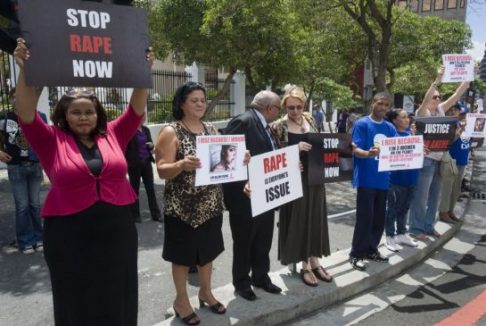Author Archive
Illegal drugs ruin lives in South Africa
Nyaope is a mixture of different substances, including heroin, marijuana, rat poison and anti-retroviral drugs (ARVs) used to treat HIV patients
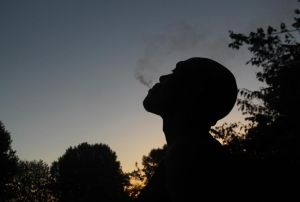
A man smokes the illegal drug called Nyaope, a mixture of different substances, including heroin, marijuana, rat poison and anti-retroviral drugs (ARVs) used to treat HIV patients
It’s a warm night in Mayfair, a suburb of Johannesburg, South Africa’s largest city.
Most businesses have already closed, except for a few drug dealers on the street corners awaiting their usual customers.
A group of five untidily dressed young men walk from the Mayfair Train Station and head straight for a street corner on the central road.
They can be seen giving money to a drug dealer who hands them a small plastic packet containing Nyaope, a cheap cocktail of drugs.
Nyaope is a mixture of different substances, including heroin, marijuana, rat poison and anti-retroviral drugs (ARVs) used to treat HIV patients. A small plastic packet of Nyaope sells for about 20 rand (roughly $1.80).
The five young men speed away after taking their drugs, heading towards Newtown near Johannesburg.
We followed them at a distance. About 15 minutes later, they were sitting under a bridge rolling their drugs into joints to smoke.
We introduced ourselves to the youths and they immediately became hostile – before our guide convinced them to talk to us.
“I left home last year after becoming addicted to Nyaope,” a 16-year-old, who identified himself as Tupak Zondi, told Anadolu Agency.
“I used to steal and sell items from my parents’ home, but when they caught me, I decided to leave,” he added, puffing on his joint.
Zondi also dropped out of school. He now looks much older than his actual age, with drug abuse and rough living having taken a toll.
Layers of black dirt now run across his once clean, light-skinned face.
Like most addicts, Zondi has not had a bath for several weeks. His hair is unkempt, his teeth are yellow and his lips are parched.
“When I wake up in the morning, I just think of one thing: smoking Nyaope,” he said.
Zondi says his body feels weak, his stomach growls and, at times, he shakes if he does not take the drug.
“It’s like an energy drink for me,” he added, a slight smile on his face while his friends laugh.
He feeds his addiction by collecting and selling scrap metal. Sometimes, however, he turns to crime to raise money.
“Sometimes we rob people who walk on foot at night,” Zondi admitted. “We take their money and cellphones.”
When asked to have his picture taken, Zondi declined and abruptly ended the interview.
One of his friends allowed himself to be photographed, but declined to give his identity.
He took us to a nearby park where he demonstrated the process involved in rolling Nyaope into joints for smoking.
He unwrapped the plastic packet, mixed marijuana into it, and rolled the mixture up in a white rolling paper before lighting it.
“This drug is powerful. It takes away all my stress,” he said between puffs.
In his 30s, he said he did different types of drugs, blaming chronic unemployment for his habit.
“Since coming to Johannesburg, I could not find a job and so resorted to drugs,” he said.
“Sometimes I find menial jobs. But I use the money for drugs and food,” he added.
He says he has seen many young lives destroyed as a result of Nyaope.
“I know many young boys and girls from well-to-do families who dropped out of school and joined us smoking this drug,” he said.
David Bayever of the CDA, South Africa’s official drug control organization, said it was difficult to determine the number of drug addicts in the country.
“It’s very complex,” he told AA. “There are many different types of drug abusers. We learn of them whenever they are arrested, in hospital or when they go to rehabilitation centers.”
According to Bayever, the CDA depends largely on figures provided by the United Nations Office on Drugs and Crime (UNODC).
Serious
Along with nyaope, some of the most commonly abused drugs in the country include alcohol, marijuana, heroin and cocaine.
Most drugs are brought into South Africa by drug cartels that distribute them through a network of dealers.
A few, however, are manufactured locally.
Clara Monnakgotla, national community developer at the South African National Council on Alcoholism and Drug Dependence, an NGO, says her organization has noticed a decrease in the average age of drug abusers.
“What we have noticed is that the age of substance abusers is decreasing – and this is very concerning,” she told AA.
She said that, despite legislation banning the consumption of alcohol by children under 18, many minors were now involved in binge drinking and drug abuse.
“It has impacted our society very negatively; most social ills are now linked to substance abuse,” Monnakgotla explained.
She said leading causes of drug abuse included trauma, poverty, peer pressure, depression and availability.
“We are engaged in the stakeholder networks with our government departments and other entities to form integrated strategies to reduce the harm, demand and supply of substance abuse,” Monnakgotla told AA.
She said her NGO’s centers were providing prevention and treatment services to local communities.
South African police, meanwhile, say they are working tirelessly to fight the illicit drug trade.
“We just pounced on drugs worth 85 million rand from Mpumalanga,” police spokesman Paul Ramoloko told AA by phone.
He said police had busted major drug hauls in different parts of the country.
“Drug consumers will feel the pinch this season,” the spokesman added. “Last year, we dismantled 34 drug laboratories and a number of people were arrested.”
He said narcotics worth millions of rand had been confiscated in recent drug busts, while several people – both South Africans and foreigners – had been arrested.
(C) Reserved. This was originally published on Anadolu Agency.
South African women still live in fear of rape
By Hassan Isilow – Anadolu Agency (Published Sunday, August 18, 2013)
JOHANNESBURG – Female activists and advocates are voicing serious doubts about South Africa’s latest crime statistics, which show a decrease in reported sexual crimes, insisting that many women in the country still live in fear of being raped.
“I don’t think the rape statistics given by the police are accurate because most rape victims fear to report rape cases to police for fear of stigmatization,” Mercy Machisa, a research officer with advocacy group Gender Links, told the Anadolu Agency in a telephone interview.
Machisa says her organization is advocating for household surveys to determine the actual number of rape victims in South Africa, which has one of the highest incidence of rape in the world with 144 reports of rape every day.
Only about half of these cases, however, ever make it to court.
According to the statistics published on the website of the South African Police Services (SAPS) sexual crimes had decreased by 1.9 percent.
In March 2011 there were 66,196 cases of rape reported with only 4,500 convictions.
In March 2012, the number of reported case went down to 64,514.
No figures for rape cases in 2013 have yet been released by the SAPS.
“There are many women out there who don’t report rape cases simply because they don’t know how the justice system works,” Lou Haysom, managing editor of Agenda newspaper, told the AA in a telephone interview.
“So you can’t believe the police statistics,” she added.
“Rape statistics are still very high.”
Haysom said that her publication covers numerous cases of gender-based violence, asserting that statistics provided by the police were probably much lower than those seen on the ground.
“We need to encourage more women to be open and report rape cases,” she said. “This is when we will know the accurate statistics.”
In April 2012, Interpol named South Africa “the rape capital of the world”, where less than 1 percent of rape cases were reported to police.
It went on to assert that South African women were more likely to be raped than educated.
– Male Culture
Machisa, the woman advocate, blames the high rate of rape in South Africa on a culture of hyper-masculinity where some men believe women are inferior compared to men.
Dr. Mamphela Ramphele, leader of South Africa’s newly formed Agang political party, shares the same conviction.
“All cultures have one thing in common – male domination,” Ramphele told students at the University of KwaZulu-Natal’s Westville campus.
“Men needed to understand their role as protectors of the family, but women were entitled to freedom and equality, as provided for in the constitution,” she added.
“We need to find a balance between democracy and traditional values,” she said, adding that customary practices contributed to women being objectified.”
South Africa celebrates August as the month of women in tribute to the thousands of women who marched to the Union Buildings in Pretoria on 9 August 1956 to protest the extension of Pass Laws to black women.
Many NGOs are using the month to raise awareness against abuse of women and children.
“We are using this month to remind the people of South Africa and the region that the struggle for women’s freedom, justice and equality continues all over the world,” said Machisa.
When asked if political will would help reduce the high rate of rape cases in the country, she said: “Fighting rape calls for more than political will from the government, but instead requires the efforts of an entire society where people need to change their attitudes towards women.”
Last week, President Jacob Zuma reassured the nation that his government was fully committed to the war against rape.
“Violence and the abuse of women and girls must come to an end in this country,” he said on Friday while delivering a speech during the national women’s day celebrations held at the Thulamahashe stadium, in Bushbuckridge Limpopo province.
Zuma said the government was finalizing work on the Women Empowerment and Gender Equality Bill, which will enforce gender equity compliance within both government and the private sector.
– Practical Steps
Haysom, the managing editor, suggested that government should train police officers on how to deal with rape as a crime since many of them do not have a clue on how to deal with rape victims while taking their statements.
She believes the government should do more in terms of creating public awareness about gender-based violence if the rape scourge was to be reduced in the country.
Lt. General Godfrey Libeya of the South African Police Services (SAPS) told the AA police encourages women to report rape cases.
When the Anadolu Agency visited the SAPS website, there was a lot of useful information educating South Africans on how to report rape.
But it seems that due to the trauma that woman go through after being raped many tend to give up and not report the crime.
In a bid to help victims report rape crimes, a Cape Town based NGO has partnered with a local cell phone chat platform Mxit and developed a mobile application which will enable women to report rape cases online.
Kathleen Dey, director of Rape Crisis, says the mobile application will guide rape survivors on how to report a rape case, take them through court process and finally offer them counseling.
“Rape Crisis is committed to offering survivors information that is clear, accurate and accessible,” Dey said in a statement, adding that Mxit currently has about 7 million active users in South Africa.
“The value of the Mxit mobile social network is that it is an inexpensive, easily accessible tool with enormous reach as it can work on nearly any phone.”
(Copy right) Anadolu Agency (Published Sunday, August 18, 2013)
South African Muslims celebrate Eid, rains disrupt prayers
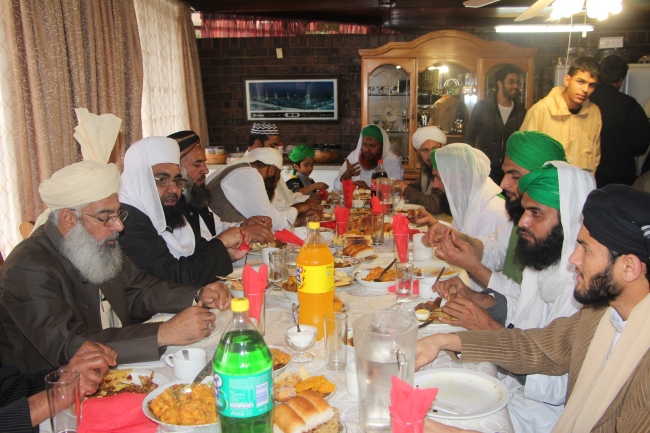 Published Saturday, August 10, 2013 on Anadolu Agency
Published Saturday, August 10, 2013 on Anadolu Agency
By Hassan Isilow – Anadolu Agency
PRETORIA – South Africa’s Muslims celebrated Eid al-Fitr, the three-day festival that follows the fasting month of Ramadan, on Friday, but heavy rains have disrupted the prayers associated with the Islamic religious festival, forcing imams to move the ritual into mosques.
“We were expecting between 5,000-7,000 people to attend the Eid prayers outside this sports ground, but unfortunately due to rain we had to change the venue to a mosque in Erasmia, which is a bit smaller in size,” Sheikh Ebrahim Tayob, the organizer of the Pretoria Eidgar, told Anadolu Agency.
He said that Eid prayers were delayed at most venues in the capital Pretoria because of the heavy rains.
“Most Imams I spoke to in different mosques told me they had delayed their prayer time from 8 a.m. to 9 a.m. because of the heavy rains.”
Sheikh Imad Kishtah who led the Eid prayers at the Erasmia mosque encouraged Muslims to remain united throughout the year.
“We have been united during the month of Ramadan and I encourage all of you to continue with the same spirit,” he told the congregation.
Following the Eid prayers, Muslims in Laudium visited graveyards to pay respects and recite prayers for the dead.
Leading Muslim scholars, meanwhile, hosted a breakfast for members of the community, where recitations of the holy Quran and lectures were given to attendees.
“Let’s continue behaving like we did in the holy month of Ramadan by helping the poor and doing other good deeds which Allah wants us to do,” Hafiz Ismail Hazarvi, the Deputy Principal of Darul Uloom Pretoria, told attendees.
He also prayed for peace in Muslim countries which were experiencing civil and political turmoil.
-Good wishes-
But Muslims in Johannesburg braved the bad weather and attended the prayers in the open space to celebrate the religious feast.
“Despite the drizzling, we prayed outside a sports ground in Mayfair and the turn-out was very good Alhamdulillah,” Sheikh Ahmed Mahmud of the Mayfair mosque in Johannesburg told AA.
Meanwhile, South African President Jacob Zuma offers happy Eid wishes to the Muslim community.
“On behalf of government and the people of South Africa, I am pleased to celebrate the end of Ramadan by wishing the Muslim community in South Africa and around the world a happy Eid al-fitr,” the president said in a statement.
Zuma also encouraged Muslims to continue with the spirit of Ramadan which teaches Muslims to be disciplined, patient and dedicated to their faith.
The leader of the Democratic Alliance, South Africa’s main opposition party, Helen Zille also offered her best wishes to Muslims.
“May this day be one of peace and joy for you and your family,” Zille said in statement.
Muslims make up around three million of South Africa’s 48.6 million population.
The community enjoys many freedoms compared to those living in other countries and participates in many sectors of the country as politics, business and academia.
There are currently a number of Muslims serving as ministers, professors and high ranking members of the civil service.
South Africa also has an Islamic leaning political party, Al- Jama-ah, which is led by Ganief Hendricks.
South Africa not budging on Morsi’s ‘unconstitutional’ ouster
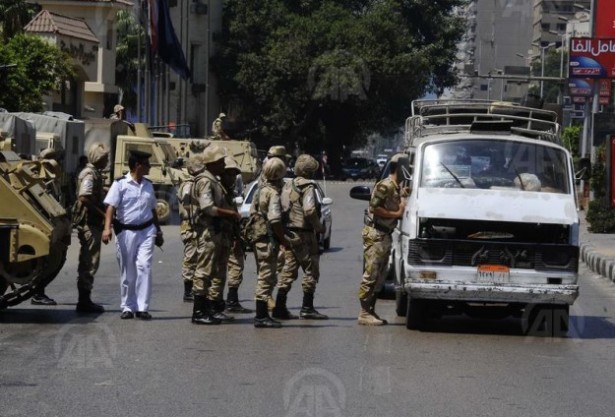 Published 31 July 2013 on Anadolu Agency 31 July 2013 21:09
Published 31 July 2013 on Anadolu Agency 31 July 2013 21:09
Despite criticism from Cairo, the South African government is standing by its classification of what recently happened in Egypt as a “military coup.”
By Hassan Isilow – Anadolu Agency
JOHANNESBURG – Despite criticism from Cairo, the South African government is standing by its classification of what recently happened in Egypt as a “military coup.”
“Our position on Egypt is very clear and we do not intend to retract our statement,” Nelson Kgwete, director for media liaison at South Africa’s Department of International Relations and Cooperation (DIRCO), told the Anadolu Agency on Wednesday.
“We also do not wish to respond further on this issue,” he added.
On Tuesday, South Africa reiterated its opposition to the July 3 ouster of Mohamed Morsi, Egypt’s first democratically elected president.
“The South African government wishes to reiterate the view that the unconstitutional removal of the democratically elected president and the suspension of the constitution of Egypt are in breach of the norms and standards adopted by the African Union (AU),” the DIRCO declared in a statement.
It also expressed concern regarding the high number of deaths among pro-Morsi demonstrators.
“Violence against a legitimate protest does not further the cause of democracy or contribute towards healing the differences between the people in a polarized society such as Egypt,” the statement added.
It reiterated support to UN chief Ban Ki-moon’s recent calls to Egyptian authorities to ensure respect for the rule of law and international human rights standards.
“South Africa joins the call by the international community for the unconditional release of President Morsi and all other political prisoners held in detention since the unconstitutional change of government on 3 July,” the DIRCO stated.
“Furthermore,” it added, “the government of South Africa also calls on all parties to refrain from acts of violence and retribution.”
The statement drew an immediate rebuke from the Egyptian Foreign Ministry.
“The insistence on describing Egypt’s popular revolution as an unconstitutional change of government, and the continued acknowledgment of the former president’s legitimacy […] is an insult to the will of millions of Egyptians,” read a strongly-worded ministry statement.
It went on to accuse the South African government of disregarding pro-Morsi protesters’ alleged use of weapons against security forces.
Egypt has been in the grip of violence since the powerful army ousted Morsi on July 3 following mass protests.
President Jacob Zuma’s advisor for international relations, Ambassador Lindiwe Zulu, has called on Egypt’s interim leaders to appoint an “all-inclusive” government.
“I would advise the interim leaders to have an all-inclusive political process if peace is to be attained, otherwise it will remain as precarious as it is,” she told the AA.
The same message was conveyed by South Africa’s DIRCO in its Tuesday statement.
“The democratic aspirations of the Egyptian people can only be addressed through an all-inclusive legal process that will bring about a sustainable democratic future,” it said.
It added: “The South African government calls on all relevant parties to engage in an inclusive political process that would lead to constitutional normality.”
Opposition to Morsi’s ouster has not been limited to the South African government.
Over two thousand people gathered outside the parliament building in Cape Town on July 17 to protest the military coup against Morsi.
The protest was organized by the Muslim Judicial Council (MJC) in a show of solidarity with pro-Morsi demonstrators in Egypt.
Protesters said they were proud of their government’s position on Egypt.
MJC spokesperson Nabeweyah Mallic said the Muslim community in Cape Town was voicing support for democracy in Egypt “in keeping with the values of the father of our nation, Nelson Mandela.”
Mandela a booming sell in South Africa
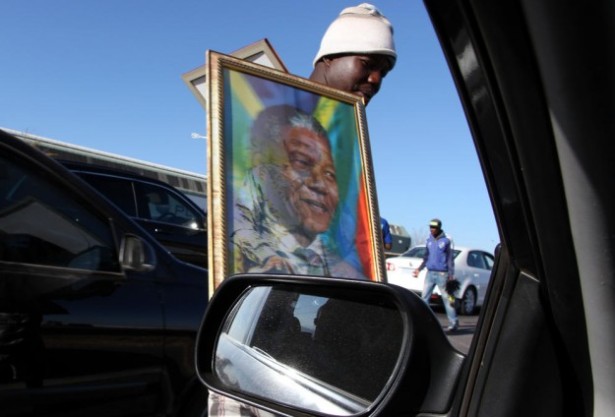 Published 28 July 2013 on Anadolu Agency
Published 28 July 2013 on Anadolu Agency
JOHANNESBURG – HASSAN ISILOW
Street vendors, designer stores and book stores in South Africa are cashing in on former president Nelson Mandela’s illness by selling portraits, T-shirts and other merchandise branded with his image.
“Every time motorists see Mandela’s portrait, they stop and buy, because his illness has created fresh interest among South Africans who love him so much’” Patrico Macia, a 28-year-old hawker, told the Anadolu Agency.
Mandela, who is revered like a saint in South Africa for fighting Apartheid, was admitted to a Pretoria hospital on June 8, suffering from a recurring long infection.
Since his admission to hospital, hawkers have taken advantage and started selling items bearing his image.
In Midrand, north of Johannesburg, several hawkers stand at busy road intersections and stop signs to lure motorists into buying Mandela branded merchandise.
“I have sold over 10 portraits of Mandela today,” said Macia, putting the price of each portrait at $20 (Rand 200).
“I can’t complain business is booming, expect for the Metro police who keep on chasing us away from the stop signs,” he added before running off to attend to a customer.
Mandela, 95, became South Africa’s first democratically elected president in 1994. He served in the office for five years.
He is revered by South Africans as the father of their nation after spending spent 27 years in prison for taking up arms to fight the apartheid regime.
The ruling African National Congress (ANC) is paying tribute to the ailing hero by placing his pictures at the ANC headquarters in central Johannesburg.
Mandela served as ANC president between 1991 and 1997.
– Iconic
In downtown Johannesburg, designer stores have stocked Mandela T-shirts, which cost between $300 – $400 depending on the quality and design.
“Most of my customers are youth and some of them have been buying two pairs of the Mandela T-shirts, because they love him,” Thabang Tobela, a store owner at one of Johannesburg’s small streets, told the AA.
However, the Mandela shirts which were made popular by the former iconic leader during his term as president in the 1990 cost slightly more.
‘”The Mandela shirts go for $850 (Rand. 850) because of the expensive fabric and those who buy them are mostly middle class people and professionals,” Tobela explained.
The Mandela shirts are long sleeved, flowered or striped shirts with big buttons, the same as those Mandela used to wear.
They are typically worn by local politicians, academics and middle class people.
When contacted for a comment, Sello Hatang, the spokesman for the Nelson Mandela Foundation, asserted it was not illegal for hawkers to sell Mandela T-shirts and portraits which did not bear his former prisoner number ‘46664.’
“We have a specified brand of clothing that we sell as a foundation to raise funds for good works,” he told the AA in a telephone interview.
“We also authorize certain stores to sell those brands.”
The restricted brands include a logo bearing Mandela’s former prison number ‘46664’.
Book stores are also making a fortune out of Mandela’s illness.
Some of the country’s leading book stores have been promoting one of Mandela’s popular books, Long Walk to Freedom.
